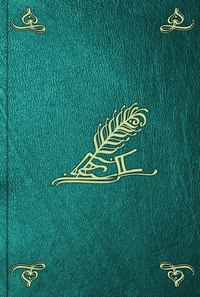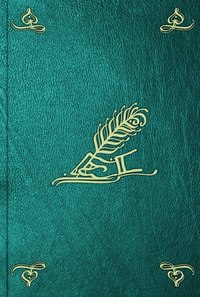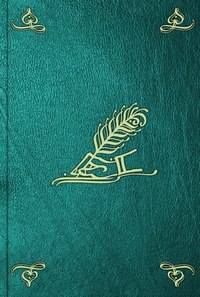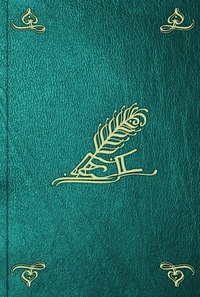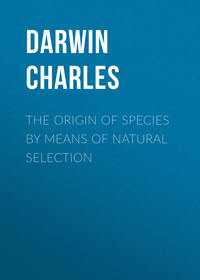 полная версия
полная версияLife and Letters of Charles Darwin — Volume 1
CHARLES DARWIN TO A.R. WALLACE. Down, December 22nd, 1857.
My dear Sir,
I thank you for your letter of September 27th. I am extremely glad to hear how you are attending to distribution in accordance with theoretical ideas. I am a firm believer that without speculation there is no good and original observation. Few travellers have attended to such points as you are now at work on; and, indeed, the whole subject of distribution of animals is dreadfully behind that of plants. You say that you have been somewhat surprised at no notice having been taken of your paper in the Annals. ('On the law that has regulated the introduction of New Species.' Ann. Nat. Hist., 1855.) I cannot say that I am, for so very few naturalists care for anything beyond the mere description of species. But you must not suppose that your paper has not been attended to: two very good men, Sir C. Lyell, and Mr. E. Blyth at Calcutta, specially called my attention to it. Though agreeing with you on your conclusions in that paper, I believe I go much further than you; but it is too long a subject to enter on my speculative notions. I have not yet seen your paper on the distribution of animals in the Aru Islands. I shall read it with the utmost interest; for I think that the most interesting quarter of the whole globe in respect to distribution, and I have long been very imperfectly trying to collect data for the Malay Archipelago. I shall be quite prepared to subscribe to your doctrine of subsidence; indeed, from the quite independent evidence of the Coral Reefs I coloured my original map (in my Coral volume) of the Aru Islands as one of subsidence, but got frightened and left it uncoloured. But I can see that you are inclined to go much further than I am in regard to the former connection of oceanic islands with continents. Ever since poor E. Forbes propounded this doctrine it has been eagerly followed; and Hooker elaborately discusses the former connection of all the Antarctic Islands and New Zealand and South America. About a year ago I discussed this subject much with Lyell and Hooker (for I shall have to treat of it), and wrote out my arguments in opposition; but you will be glad to hear that neither Lyell nor Hooker thought much of my arguments. Nevertheless, for once in my life, I dare withstand the almost preternatural sagacity of Lyell.
You ask about land-shells on islands far distant from continents: Madeira has a few identical with those of Europe, and here the evidence is really good, as some of them are sub-fossil. In the Pacific Islands there are cases of identity, which I cannot at present persuade myself to account for by introduction through man's agency; although Dr. Aug. Gould has conclusively shown that many land-shells have thus been distributed over the Pacific by man's agency. These cases of introduction are most plaguing. Have you not found it so in the Malay Archipelago? It has seemed to me in the lists of mammals of Timor and other islands, that SEVERAL in all probability have been naturalised...
You ask whether I shall discuss "man." I think I shall avoid the whole subject, as so surrounded with prejudices; though I fully admit that it is the highest and most interesting problem for the naturalist. My work, on which I have now been at work more or less for twenty years, will not fix or settle anything; but I hope it will aid by giving a large collection of facts, with one definite end. I get on very slowly, partly from ill-health, partly from being a very slow worker. I have got about half written; but I do not suppose I shall publish under a couple of years. I have now been three whole months on one chapter on Hybridism!
I am astonished to see that you expect to remain out three or four years more. What a wonderful deal you will have seen, and what interesting areas — the grand Malay Archipelago and the richest parts of South America! I infinitely admire and honour your zeal and courage in the good cause of Natural Science; and you have my very sincere and cordial good wishes for success of all kinds, and may all your theories succeed, except that on Oceanic Islands, on which subject I will do battle to the death.
Pray believe me, my dear sir, yours very sincerely, C. DARWIN.
CHARLES DARWIN TO W.D. FOX. February 8th [1858].
...I am working very hard at my book, perhaps too hard. It will be very big, and I am become most deeply interested in the way facts fall into groups. I am like Croesus overwhelmed with my riches in facts, and I mean to make my book as perfect as ever I can. I shall not go to press at soonest for a couple of years...
CHARLES DARWIN TO J.D. HOOKER. February 23rd [1858].
...I was not much struck with the great Buckle, and I admired the way you stuck up about deduction and induction. I am reading his book ('The History of Civilisation.'), which, with much sophistry, as it seems to me, is WONDERFULLY clever and original, and with astounding knowledge.
I saw that you admired Mrs. Farrer's 'Questa tomba' of Beethoven thoroughly; there is something grand in her sweet tones.
Farewell. I have partly written this note to drive bee's-cells out of my head; for I am half-mad on the subject to try to make out some simple steps from which all the wondrous angles may result. (He had much correspondence on this subject with the late Professor Miller of Cambridge.)
I was very glad to see Mrs. Hooker on Friday; how well she appears to be and looks.
Forgive your intolerable but affectionate friend, C. DARWIN.
CHARLES DARWIN TO W.D. FOX. Down, April 16th [1858].
My dear Fox,
I want you to observe one point for me, on which I am extremely much interested, and which will give you no trouble beyond keeping your eyes open, and that is a habit I know full well that you have.
I find horses of various colours often have a spinal band or stripe of different and darker tint than the rest of the body; rarely transverse bars on the legs, generally on the under-side of the front legs, still more rarely a very faint transverse shoulder-stripe like an ass.
Is there any breed of Delamere forest ponies? I have found out little about ponies in these respects. Sir P. Egerton has, I believe, some quite thoroughbred chestnut horses; have any of them the spinal stripe? Mouse-coloured ponies, or rather small horses, often have spinal and leg bars. So have dun horses (by dun I mean real colour of cream mixed with brown, bay, or chestnut). So have sometimes chestnuts, but I have not yet got a case of spinal stripe in chestnut, race horse, or in quite heavy cart-horse. Any fact of this nature of such stripes in horses would be MOST useful to me. There is a parallel case in the legs of the donkey, and I have collected some most curious cases of stripes appearing in various crossed equine animals. I have also a large mass of parallel facts in the breeds of pigeons about the wing bars. I SUSPECT it will throw light on the colour of the primeval horse. So do help me if occasion turns up...My health has been lately very bad from overwork, and on Tuesday I go for a fortnight's hydropathy. My work is everlasting. Farewell.
My dear Fox, I trust you are well. Farewell, C. DARWIN.
CHARLES DARWIN TO J.D. HOOKER. Moor Park, Farnham [April 26th, 1858].
...I have just had the innermost cockles of my heart rejoiced by a letter from Lyell. I said to him (or he to me) that I believed from the character of the flora of the Azores, that icebergs must have been stranded there; and that I expected erratic boulders would be detected embedded between the upheaved lava-beds; and I got Lyell to write to Hartung to ask, and now H. says my question explains what had astounded him, viz., large boulders (and some polished) of mica-schist, quartz, sandstone, etc., some embedded, and some 40 and 50 feet above the level of the sea, so that he had inferred that they had not been brought as ballast. Is this not beautiful?
The water-cure has done me some good, but I [am] nothing to boast of to-day, so good-bye.
My dear friend, yours, C.D.
CHARLES DARWIN TO C. LYELL. Moor Park, Farnham, April 26th [1858].
My dear Lyell,
I have come here for a fortnight's hydropathy, as my stomach had got, from steady work, into a horrid state. I am extremely much obliged to you for sending me Hartung's interesting letter. The erratic boulders are splendid. It is a grand case of floating ice versus glaciers. He ought to have compared the northern and southern shores of the islands. It is eminently interesting to me, for I have written a very long chapter on the subject, collecting briefly all the geological evidence of glacial action in different parts of the world, and then at great length (on the theory of species changing) I have discussed the migration and modification of plants and animals, in sea and land, over a large part of the world. To my mind, it throws a flood of light on the whole subject of distribution, if combined with the modification of species. Indeed, I venture to speak with some little confidence on this, for Hooker, about a year ago, kindly read over my chapter, and though he then demurred gravely to the general conclusion, I was delighted to hear a week or two ago that he was inclined to come round pretty strongly to my views of distribution and change during the glacial period. I had a letter from Thompson, of Calcutta, the other day, which helps me much, as he is making out for me what heat our temperate plants can endure. But it is too long a subject for a note; and I have written thus only because Hartung's note has set the whole subject afloat in my mind again. But I will write no more, for my object here is to think about nothing, bathe much, walk much, eat much, and read much novels. Farewell, with many thanks, and very kind remembrance to Lady Lyell.
Ever yours, C. DARWIN.
CHARLES DARWIN TO MRS. DARWIN. Moor Park, Wednesday, April [1858].
The weather is quite delicious. Yesterday, after writing to you, I strolled a little beyond the glade for an hour and a half, and enjoyed myself — the fresh yet dark-green of the grand Scotch firs, the brown of the catkins of the old birches, with their white stems, and a fringe of distant green from the larches made an excessively pretty view. At last I fell fast asleep on the grass, and awoke with a chorus of birds singing around me, and squirrels running up the trees, and some woodpeckers laughing, and it was as pleasant and rural a scene as ever I saw, and I did not care one penny how any of the beasts or birds had been formed. I sat in the drawing-room till after eight, and then went and read the Chief Justice's summing up, and thought Bernard (Simon Bernard was tried in April 1858 as an accessory to Orsini's attempt on the life of the Emperor of the French. The verdict was "not guilty.") guilty, and then read a bit of my novel, which is feminine, virtuous, clerical, philanthropical, and all that sort of thing, but very decidedly flat. I say feminine, for the author is ignorant about money matters, and not much of a lady — for she makes her men say, "My Lady." I like Miss Craik very much, though we have some battles, and differ on every subject. I like also the Hungarian; a thorough gentleman, formerly attache at Paris, and then in the Austrian cavalry, and now a pardoned exile, with broken health. He does not seem to like Kossuth, but says, he is certain [he is] a sincere patriot, most clever and eloquent, but weak, with no determination of character...
CHAPTER 1. XIII. — THE WRITING OF THE 'ORIGIN OF SPECIES.'
JUNE 18, 1858, TO NOVEMBER, 1859[The letters given in the present chapter tell their story with sufficient clearness, and need but a few words of explanation. Mr. Wallace's Essay, referred to in the first letter, bore the sub-title, 'On the Tendency of Varieties to depart indefinitely from the Original Type,' was published in the Linnean Society's Journal (1858, volume iii. page 53) as part of the joint paper of "Messrs. C. Darwin and A. Wallace," of which the full title was 'On the Tendency of Species to form Varieties; and on the Perpetuation of Varieties and Species by Natural Means of Selection.'
My father's contribution to the paper consisted of (1) Extracts from the sketch of 1844; (2) part of a letter addressed to Dr Asa Gray, dated September 5, 1857, and which is given above. The paper was "communicated" to the Society by Sir Charles Lyell and Sir Joseph Hooker, in whose prefatory letter, a clear account of the circumstances of the case is given.
Referring to Mr. Wallace's Essay, they wrote:
"So highly did Mr. Darwin appreciate the value of the views therein set forth, that he proposed, in a letter to Sir Charles Lyell, to obtain Mr. Wallace's consent to allow the Essay to be published as soon as possible. Of this step we highly approved, provided Mr. Darwin did not withhold from the public, as he was strongly inclined to do (in favour of Mr. Wallace), the memoir which he had himself written on the same subject, and which, as before stated, one of us had perused in 1844, and the contents of which we had both of us been privy to for many years. On representing this to Mr. Darwin, he gave us permission to make what use we thought proper of his memoir, etc.; and in adopting our present course, of presenting it to the Linnean Society, we have explained to him that we are not solely considering the relative claims to priority of himself and his friend, but the interests of science generally."]
LETTERS.
CHARLES DARWIN TO C. LYELL. Down, 18th [June 1858].
My dear Lyell,
Some year or so ago you recommended me to read a paper by Wallace in the 'Annals' ('Annals and Magazine of Natural History', 1855.), which had interested you, and, as I was writing to him, I knew this would please him much, so I told him. He has to-day sent me the enclosed, and asked me to forward it to you. It seems to me well worth reading. Your words have come true with a vengeance — that I should be forestalled. You said this, when I explained to you here very briefly my views of 'Natural Selection' depending on the struggle for existence. I never saw a more striking coincidence; if Wallace had my MS. sketch written out in 1842, he could not have made a better short abstract! Even his terms now stand as heads of my chapters. Please return me the MS., which he does not say he wishes me to publish, but I shall of course, at once write and offer to send to any journal. So all my originality, whatever it may amount to, will be smashed, though my book, if it will ever have any value, will not be deteriorated; as all the labour consists in the application of the theory.
I hope you will approve of Wallace's sketch, that I may tell him what you say.
My dear Lyell, yours most truly, C. DARWIN.
CHARLES DARWIN TO C. LYELL. Down, Friday [June 25, 1858].
My dear Lyell,
I am very sorry to trouble you, busy as you are, in so merely a personal an affair; but if you will give me your deliberate opinion, you will do me as great a service as ever man did, for I have entire confidence in your judgment and honour...
There is nothing in Wallace's sketch which is not written out much fuller in my sketch, copied out in 1844, and read by Hooker some dozen years ago. About a year ago I sent a short sketch, of which I have a copy, of my views (owing to correspondence on several points) to Asa Gray, so that I could most truly say and prove that I take nothing from Wallace. I should be extremely glad now to publish a sketch of my general views in about a dozen pages or so; but I cannot persuade myself that I can do so honourably. Wallace says nothing about publication, and I enclose his letter. But as I had not intended to publish any sketch, can I do so honourably, because Wallace has sent me an outline of his doctrine? I would far rather burn my whole book, than that he or any other man should think that I had behaved in a paltry spirit. Do you not think his having sent me this sketch ties my hands?.. If I could honourably publish, I would state that I was induced now to publish a sketch (and I should be very glad to be permitted to say, to follow your advice long ago given) from Wallace having sent me an outline of my general conclusions. We differ only, [in] that I was led to my views from what artificial selection has done for domestic animals. I would send Wallace a copy of my letter to Asa Gray, to show him that I had not stolen his doctrine. But I cannot tell whether to publish now would not be base and paltry. This was my first impression, and I should have certainly acted on it had it not been for your letter.
This is a trumpery affair to trouble you with, but you cannot tell how much obliged I should be for your advice.
By the way, would you object to send this and your answer to Hooker to be forwarded to me, for then I shall have the opinion of my two best and kindest friends. This letter is miserably written, and I write it now, that I may for a time banish the whole subject; and I am worn out with musing...
My good dear friend forgive me. This is a trumpery letter, influenced by trumpery feelings.
Yours most truly, C. DARWIN.
I will never trouble you or Hooker on the subject again.
CHARLES DARWIN TO C. LYELL. Down, 26th [June, 1858].
My dear Lyell,
Forgive me for adding a P.S. to make the case as strong as possible against myself.
Wallace might say, "You did not intend publishing an abstract of your views till you received my communication. Is it fair to take advantage of my having freely, though unasked, communicated to you my ideas, and thus prevent me forestalling you?" The advantage which I should take being that I am induced to publish from privately knowing that Wallace is in the field. It seems hard on me that I should be thus compelled to lose my priority of many years' standing, but I cannot feel at all sure that this alters the justice of the case. First impressions are generally right, and I at first thought it would be dishonourable in me now to publish.
Yours most truly, C. DARWIN.
P.S. — I have always thought you would make a first-rate Lord Chancellor; and I now appeal to you as a Lord Chancellor.
CHARLES DARWIN TO J.D. HOOKER. Down, Tuesday [June 29, 1858].
...I have received your letters. I cannot think now (So soon after the death, from scarlet fever, of his infant child.) on the subject, but soon will. But I can see that you have acted with more kindness, and so has Lyell, even than I could have expected from you both, most kind as you are.
I can easily get my letter to Asa Gray copied, but it is too short.
...God bless you. You shall hear soon, as soon as I can think.
Yours affectionately, C. DARWIN.
CHARLES DARWIN TO J.D. HOOKER. Tuesday night [June 29, 1858].
My dear Hooker,
I have just read your letter, and see you want the papers at once. I am quite prostrated, and can do nothing, but I send Wallace, and the abstract ("Abstract" is here used in the sense of "extract;" in this sense also it occurs in the 'Linnean Journal,' where the sources of my father's paper are described.) of my letter to Asa Gray, which gives most imperfectly only the means of change, and does not touch on reasons for believing that species do change. I dare say all is too late. I hardly care about it. But you are too generous to sacrifice so much time and kindness. It is most generous, most kind. I send my sketch of 1844 solely that you may see by your own handwriting that you did read it. I really cannot bear to look at it. Do not waste much time. It is miserable in me to care at all about priority.
The table of contents will show what it is.
I would make a similar, but shorter and more accurate sketch for the 'Linnean Journal.'
I will do anything. God bless you, my dear kind friend.
I can write no more. I send this by my servant to Kew.
Yours, C. DARWIN.
[The following letter is that already referred to as forming part of the joint paper published in the Linnean Society's 'Journal,' 1858]: —
CHARLES DARWIN TO ASA GRAY. Down, September 5th [1857]. (The date is given as October in the 'Linnean Journal.' The extracts were printed from a duplicate undated copy in my father's possession, on which he had written, "This was sent to Asa Gray 8 or 9 months ago, I think October 1857.")
My dear Gray,
I forget the exact words which I used in my former letter, but I dare say I said that I thought you would utterly despise me when I told you what views I had arrived at, which I did because I thought I was bound as an honest man to do so. I should have been a strange mortal, seeing how much I owe to your quite extraordinary kindness, if in saying this I had meant to attribute the least bad feeling to you. Permit me to tell you that, before I had ever corresponded with you, Hooker had shown me several of your letters (not of a private nature), and these gave me the warmest feeling of respect to you; and I should indeed be ungrateful if your letters to me, and all I have heard of you, had not strongly enhanced this feeling. But I did not feel in the least sure that when you knew whither I was tending, that you might not think me so wild and foolish in my views (God knows, arrived at slowly enough, and I hope conscientiously), that you would think me worth no more notice or assistance. To give one example: the last time I saw my dear old friend Falconer, he attacked me most vigorously, but quite kindly, and told me, "You will do more harm than any ten Naturalists will do good. I can see that you have already CORRUPTED and half-spoiled Hooker!!" Now when I see such strong feeling in my oldest friends, you need not wonder that I always expect my views to be received with contempt. But enough and too much of this.
I thank you most truly for the kind spirit of your last letter. I agree to every word in it, and think I go as far as almost any one in seeing the grave difficulties against my doctrine. With respect to the extent to which I go, all the arguments in favour of my notions fall RAPIDLY away, the greater the scope of forms considered. But in animals, embryology leads me to an enormous and frightful range. The facts which kept me longest scientifically orthodox are those of adaptation — the pollen-masses in asclepias — the mistletoe, with its pollen carried by insects, and seed by birds — the woodpecker, with its feet and tail, beak and tongue, to climb the tree and secure insects. To talk of climate or Lamarckian habit producing such adaptations to other organic beings is futile. This difficulty I believe I have surmounted. As you seem interested in the subject, and as it is an IMMENSE advantage to me to write to you and to hear, ever so briefly, what you think, I will enclose (copied, so as to save you trouble in reading) the briefest abstract of my notions on the means by which Nature makes her species. Why I think that species have really changed, depends on general facts in the affinities, embryology, rudimentary organs, geological history, and geographical distribution of organic beings. In regard to my Abstract, you must take immensely on trust, each paragraph occupying one or two chapters in my book. You will, perhaps, think it paltry in me, when I ask you not to mention my doctrine; the reason is, if any one, like the author of the 'Vestiges,' were to hear of them, he might easily work them in, and then I should have to quote from a work perhaps despised by naturalists, and this would greatly injure any chance of my views being received by those alone whose opinions I value. [Here follows a discussion on "large genera varying," which has no direct connection with the remainder of the letter.]
I. It is wonderful what the principle of Selection by Man, that is the picking out of individuals with any desired quality, and breeding from them, and again picking out, can do. Even breeders have been astonished at their own results. They can act on differences inappreciable to an uneducated eye. Selection has been METHODICALLY followed in Europe for only the last half century. But it has occasionally, and even in some degree methodically, been followed in the most ancient times. There must have been also a kind of unconscious selection from the most ancient times, namely, in the preservation of the individual animals (without any thought of their offspring) most useful to each race of man in his particular circumstances. The "roguing," as nursery-men call the destroying of varieties, which depart from their type, is a kind of selection. I am convinced that intentional and occasional selection has been the main agent in making our domestic races. But, however this may be, its great power of modification has been indisputedly shown in late times. Selection acts only by the accumulation of very slight or greater variations, caused by external conditions, or by the mere fact that in generation the child is not absolutely similar to its parent. Man, by this power of accumulating variations, adapts living beings to his wants — he MAY BE SAID to make the wool of one sheep good for carpets, and another for cloth, etc.


